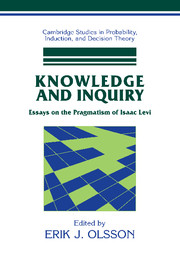Book contents
- Frontmatter
- Contents
- List of Contributors
- Preface
- Introduction: The Pragmatism of Isaac Levi
- 1 Isaac Levi and His Pragmatist Lineage
- 2 Is Pragmatist Truth Irrelevant to Inquiry?
- 3 The Knowledge Business
- 4 Infallibility and Incorrigibility
- 5 Why Inconsistency Is Not Hell: Making Room for Inconsistency in Science
- 6 Levi on Risk
- 7 Vexed Convexity
- 8 Levi's Chances
- 9 Isaac Levi's Potentially Surprising Epistemological Picture
- 10 Isaac Levi on Abduction
- 11 Potential Answers – To What Question?
- 12 Levi and the Lottery
- 13 The Value of Truth and the Value of Information: On Isaac Levi's Epistemology
- 14 Decision-Theoretic Contraction and Sequential Change
- 15 Deciding What You Know
- 16 Levi's Ideals
- 17 The Mind We do Not Change
- 18 Psychoanalysis as Technology
- 19 Levi on Money Pumps and Diachronic Dutch Books
- 20 Levi on the Reality of Dispositions
- 21 Replies
- Index
15 - Deciding What You Know
Published online by Cambridge University Press: 05 March 2010
- Frontmatter
- Contents
- List of Contributors
- Preface
- Introduction: The Pragmatism of Isaac Levi
- 1 Isaac Levi and His Pragmatist Lineage
- 2 Is Pragmatist Truth Irrelevant to Inquiry?
- 3 The Knowledge Business
- 4 Infallibility and Incorrigibility
- 5 Why Inconsistency Is Not Hell: Making Room for Inconsistency in Science
- 6 Levi on Risk
- 7 Vexed Convexity
- 8 Levi's Chances
- 9 Isaac Levi's Potentially Surprising Epistemological Picture
- 10 Isaac Levi on Abduction
- 11 Potential Answers – To What Question?
- 12 Levi and the Lottery
- 13 The Value of Truth and the Value of Information: On Isaac Levi's Epistemology
- 14 Decision-Theoretic Contraction and Sequential Change
- 15 Deciding What You Know
- 16 Levi's Ideals
- 17 The Mind We do Not Change
- 18 Psychoanalysis as Technology
- 19 Levi on Money Pumps and Diachronic Dutch Books
- 20 Levi on the Reality of Dispositions
- 21 Replies
- Index
Summary
You are driving with your partner late in the afternoon of a hard day. She asks you, “Do you know if the bank is open tomorrow? It's a Saturday.” “Yes, it will be open,” you reply. “Thing is,” she continues, “we're both tired. It would be nice to quit for today and go to the bank tomorrow. Mind you, if you're wrong and the bank isn't actually open tomorrow, we won't be able to make the mortgage payment on the house and we will lose it to our lender.” Would it be entirely surprising if you replied, “I take it back; I don't know if it will be open – let's go now”?
I think we can all agree that it would not be entirely surprising. And I think we can also all agree that, all the same, the reply leaves us a bit uncomfortable. The thought is this. Whether you know the bank is open on Saturday depends entirely on how you are epistemically situated with respect to the proposition that it will be open Saturday. What the stakes are, should you act as if the bank will be open Saturday, affects not a bit your epistemic situation with respect to that proposition. So, your epistemic situation with respect to the proposition that the bank will be open Saturday cannot properly be thought to change when you learn of the stakes that ride on the bank's being open then.
- Type
- Chapter
- Information
- Knowledge and InquiryEssays on the Pragmatism of Isaac Levi, pp. 225 - 240Publisher: Cambridge University PressPrint publication year: 2006
- 2
- Cited by

